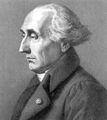Template:Selected anniversaries/July 23: Difference between revisions
Jump to navigation
Jump to search
No edit summary |
No edit summary |
||
| (31 intermediate revisions by the same user not shown) | |||
| Line 1: | Line 1: | ||
<gallery> | <gallery> | ||
||1584 | ||1584: John Day dies ... printer. No DOB. Pic. | ||
|| | File:Joseph-Louis Lagrange.jpg|link=Joseph-Louis Lagrange (nonfiction)|1754: [[Joseph-Louis Lagrange (nonfiction)|Joseph-Louis Lagrange]] publishes his first work, in the form of a letter in Italian. A month later he realized that he had rediscovered Leibniz's formula for the nth derivative of a product. | ||
|| | ||1773: George Edwards dies ... biologist and ornithologist. Pic. | ||
||1775 | ||1796: Franz Berwald born ... surgeon and composer. | ||
||1775: Étienne-Louis Malus born ... physicist and mathematician. | |||
File:Typographer patent 1829.jpg|link=Typographer (typewriter) (nonfiction)|1829: William Austin Burt patents the [[Typographer (typewriter) (nonfiction)|typographer]], a precursor to the typewriter. | File:Typographer patent 1829.jpg|link=Typographer (typewriter) (nonfiction)|1829: William Austin Burt patents the [[Typographer (typewriter) (nonfiction)|typographer]], a precursor to the typewriter. | ||
||1875: Isaac Singer dies ... inventor, actor, and businessman. He made important improvements in the design of the sewing machine and was the founder of what became one of the first American multi-national businesses, the Singer Sewing Machine Company. Pic. | |||
||1878: Carl von Rokitansky dies ... physician, pathologist, and philosopher. Pic. | |||
||1883: Włodzimierz Stożek born ... mathematician. He published numerous papers on the theory of integral equations, potential theory, as well as on many other branches of mathematics. Pic. | |||
||1884: "Dilly" Knox born ... classics scholar and papyrologist at King's College, Cambridge and a codebreaker. As a member of the Room 40 codebreaking unit he helped decrypt the Zimmermann Telegram which brought the USA into the First World War. He joined the Government Code and Cypher School (GC&CS) at the war's end. Pic search. | |||
||1886: Walter H. Schottky born ... physicist and engineer. Pic. | |||
||1895: William Bleckwenn born ... neurologist, psychiatrist, and military physician, who was instrumental in developing the treatment known as "narcoanalysis" or "narcosynthesis", also known by the lay term "truth serum". Pic. | |||
||1903: Theodore Christian Schneirla born ... comparative psychologist whose empirical work was based on observations on the behavior patterns of army ants. His "biphasic A-W theory" reduced all behavior to two simple responses: approach and withdrawal -- we approach what causes pleasure, and we withdraw from what causes unpleasure or pain. | |||
|| | ||1906: Vladimir Prelog, Croatian-Swiss chemist and academic, Nobel Prize laureate. Pic. | ||
|| | ||1907: Charles Bradfield Morrey Jr. born ... mathematician who made fundamental contributions to the calculus of variations and the theory of partial differential equations. | ||
||1916 | ||1912: Jean Louis Maxime van Heijenoort born ... pioneer historian of mathematical logic. He was also a personal secretary to Leon Trotsky from 1932 to 1939, and from then until 1947, an American Trotskyist activist. Pic. | ||
||1916: William Ramsay dies ... chemist and academic, Nobel Prize laureate. Pic. | |||
||1920: Mathematician, engineer, and academic Ray William Clough born. Clough was a pioneer of the finite element method (FEM). He coined the term "finite elements" in an article in 1960. Pic search. | |||
File:Vera Rubin.jpg|link=Vera Rubin (nonfiction)|1928: Astronomer and academic [[Vera Rubin (nonfiction)|Vera Rubin]] born. She will discover the discrepancy between the predicted angular motion of galaxies and the observed motion, by studying galactic rotation curves. | File:Vera Rubin.jpg|link=Vera Rubin (nonfiction)|1928: Astronomer and academic [[Vera Rubin (nonfiction)|Vera Rubin]] born. She will discover the discrepancy between the predicted angular motion of galaxies and the observed motion, by studying galactic rotation curves. | ||
||1929 | ||1929: The Fascist government in Italy bans the use of foreign words. | ||
||1930 | ||1930: Glenn Curtiss dies ... pilot and engineer. | ||
||1942: Valdemar Poulsen dies ... engineer who made significant contributions to early radio technology. He developed a magnetic wire recorder called the telegraphone in 1899 and the first continuous wave radio transmitter, the Poulsen arc transmitter, in 1903, which was used in some of the first broadcasting stations until the early 1920s. Pic. | |||
File:Telstar.jpg|link=Telstar (nonfiction)|1962: [[Telstar (nonfiction)|Telstar]] relays the first publicly transmitted, live trans-Atlantic television program, featuring Walter Cronkite. | File:Telstar.jpg|link=Telstar (nonfiction)|1962: [[Telstar (nonfiction)|Telstar]] relays the first publicly transmitted, live trans-Atlantic television program, featuring Walter Cronkite. | ||
||1968 | ||1964: Werner Wolfgang Rogosinski dies ... mathematician. His interest was analytical problems, especially in series. His dissertation, "New Application of Pfeiffer's method for Dirichlet's divisor problem", caused a stir in 1922. Pic. | ||
||1964: Samarendra Nath Roy dies ... mathematician and an applied statistician. Pic. | |||
||1968: Henry Hallett Dale dies ... pharmacologist and physiologist, Nobel Prize laureate. Pic. | |||
||1972: The United States launches Landsat 1, the first Earth-resources satellite. | |||
||1977: Jesse Wakefield Beams dies ... physicist. Manhattan project. Pic: gravestone. | |||
||1981: Lazar Aronovich Lyusternik dies ... mathematician. He is famous for his work in topology and differential geometry, to which he applied the variational principle. | |||
||1983: 1983 - Gimli Glider - Air Canada 767 runs out of fuel in midair and makes emergency glide landing at Gimli airstrip; due to metric confusion and fuel metering problems. Pic: interesting photo, plane nose-down on runway: http://canadachannel.ca/todayincanadianhistory/index.php/July_23 | |||
|| | ||1989: Alexander Weygers dies ... polymath Dutch-American artist who is best known as a sculptor, painter, print maker, blacksmith, carpenter, philosopher, mechanical engineer, aerospace engineer and author. Pic. | ||
||1990 | ||1990: Kenjiro Takayanagi, Japanese engineer (b. 1899) Father of Japanese television. Kenjiro Takayanagi (d. July 23, 1990 in Yokosuka) was a Japanese engineer and a pioneer in the development of television. Although he failed to gain much recognition in the West, he built the world's first all-electronic television receiver, and is referred to as "the father of Japanese television". | ||
||1995 | ||1995: Comet Hale–Bopp is discovered; it becomes visible to the naked eye on Earth nearly a year later. | ||
|| | ||2006: Charles Frederick Mosteller dies ... one of the most eminent statisticians of the 20th century. Pic: https://www.google.com/imgres?imgurl=x-raw-image%3A%2F%2F%2F9fff90814bdb2b37665bf85fb0409670db7ed01cb0366833d3d6e03f59f90c07&imgrefurl=http%3A%2F%2Fwww.nasonline.org%2Fpublications%2Fbiographical-memoirs%2Fmemoir-pdfs%2Fmosteller-frederick.pdf&docid=zX_zisTRZzGcFM&tbnid=NyvbS4GQ_5-TbM%3A&vet=10ahUKEwiQlY6whobdAhUM2IMKHQAgBWwQMwg7KAEwAQ..i&w=557&h=646&bih=588&biw=1175&q=Frederick%20Mosteller&ved=0ahUKEwiQlY6whobdAhUM2IMKHQAgBWwQMwg7KAEwAQ&iact=mrc&uact=8 | ||
|| | ||2012: Sally Ride, American physicist and astronaut. | ||
|| | ||2015: NASA announces discovery of Kepler-452b by Kepler. | ||
||2017: Florence Steinberg dies ... publisher of one of the first independent comic books, the underground/alternative comics hybrid Big Apple Comix, in 1975. Additionally, as the secretary for Marvel Comics editor Stan Lee and the fledgling company's receptionist and fan liaison during the 1960s Silver Age of Comic Books, she was a key participant of and witness to Marvel's expansion from a two-person staff to a pop culture conglomerate. Pic (charming). | |||
</gallery> | </gallery> | ||
Latest revision as of 10:19, 7 February 2022
1754: Joseph-Louis Lagrange publishes his first work, in the form of a letter in Italian. A month later he realized that he had rediscovered Leibniz's formula for the nth derivative of a product.
1829: William Austin Burt patents the typographer, a precursor to the typewriter.
1928: Astronomer and academic Vera Rubin born. She will discover the discrepancy between the predicted angular motion of galaxies and the observed motion, by studying galactic rotation curves.
1962: Telstar relays the first publicly transmitted, live trans-Atlantic television program, featuring Walter Cronkite.



